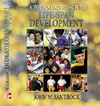 |  Life-Span Development: A Topical Approach John W. Santrock
Socioemotional Processes and Development The Self, Identity, and Personality
Learning Objectives1.Explore the meaning of and overlap in the concepts of self, identity, and personality. |
 |  |  | 2.Discuss self-understanding as the cognitive representation of the self, as well as the substance and content of self conceptions, and describe the developmental changes that characterize self-understanding throughout the life span. |
 |  |  | 3.Explain how the process of self-regulation changes across the life span, then note how Baltes proposed the selective optimization with compensation theory of self-regulation and the ability of older adults to engage in self-regulation despite encountering losses. |
 |  |  | 4.Differentiate between self-esteem and self-concept, describe how self-evaluations and self-esteem change (or do not change) across the life span, then delineate four ways to increase self-esteem. |
 |  |  | 5.Describe Erikson's theory of life-span development from his first stage of trust versus mistrust through the eighth stage of integrity versus despair, and note how despite the lack of an adequate research base for his theory, Erikson remains a giant in the field of socioemotional development. |
 |  |  | 6.Discuss how Erikson describes the adolescent's psychological moratorium between childhood dependence and adult independence, to promote identity exploration, noting that identity is a self-portrait with many pieces, then look at the research on identity, specifically addressing Marcia's identity statuses, the advancement of individuality and connectedness in relationships between adolescents and their parents, the importance of ethnic identity for minority adolescents, and the MAMA cycles that characterize adult identity development. |
 |  |  | 7.Journey through the major personality theories (psychoanalytic, behavioral, social cognitive, humanistic, and trait), then examine the important adult developmental views, noting how the midlife crisis has been exaggerated and that personality development is characterized by individual variation, then discuss how longitudinal studies have shown both stability and change in adult personality development. |
|



 2002 McGraw-Hill Higher Education
2002 McGraw-Hill Higher Education